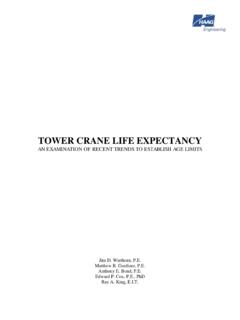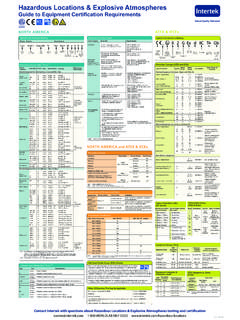Transcription of Budgeting in Russia - OECD
1 ISSN 1608-7143. OECD Journal on Budgeting Volume 8 No. 2. OECD 2008. Budgeting in Russia by Dirk-Jan Kraan, Daniel Bergvall, Ian Hawkesworth, Valentina Kostyleva and Matthias Witt*. Russia 's Budgeting procedures have been in transition since the adoption of the Budget code in 1998. Major revisions of the code were undertaken in 2003, 2004 and 2007. This article explores the key characteristics of Budgeting in the Russian Federation. The article examines budget formulation, parliamentary approval, budget execution, accounting and auditing, and financial relations between levels of government. * Dirk-Jan Kraan and Ian Hawkesworth are, respectively, senior economist and administrator in the Budgeting and Public Expenditures Division of the Public Governance and Territorial Development Directorate, OECD.
2 At the time of writing, Daniel Bergvall and Valentina Kostyleva were, respectively, project manager and consultant in the same division. Matthias Witt is a senior economist at German Technical Cooperation (GTZ). 1. Budgeting IN Russia . Preface This review of the budget procedure of the Russian Federation was carried out as part of the work programme of the OECD Working Party of Senior Budget Officials (SBO) to which the network of Senior Budget Officials of Central, Eastern and South-Eastern European countries reports. The network was established in 2004 at the initiative of the Working Party of Senior Budget Officials. Budget reviews serve as a basis for the examination of the budget procedure during the annual meetings of the Working Party or the network, and enable the participants to discuss the budget procedure of the country under examination in depth.
3 A mission consisting of Dr. Dirk-Jan Kraan (head), Mr. Daniel Bergvall, Mr. Ian Hawkesworth, Mrs. Valentina Kostyleva (OECD Secretariat) and Dr. Matthias Witt (German Technical Cooperation) visited Moscow from 1 to 5 October 2007 to carry out the review. During its visit the mission met with: Mrs. Tatiana Nesterenko, Deputy Minister of Finance, Mr. Alexey Lavrov, Director of the Budget Policy Department, Mr. Roman Artiukhin, Head of the Federal Treasury, and senior officials of the Ministry of Finance of the Russian Federation; Mr. Dmitry Amunts, Deputy Minister of the Ministry of Culture and Media;. Mr. Vadim Dubinkin, Head of the General Audit Department of the Accounts Chamber of the Russian Federation; Mrs.
4 Vera Kotelnikova, Deputy Head of the Secretariat of the Budget and Tax Committee of the State Duma of the Russian Federation; Mr. Evgeni Bushmin, Chairman of the Budget Committee of the Council of Federation of the Federal Assembly; Mr. Sergei Drobyshevsky, Head of the Budget Policy Unit, and other senior policy analysts of the Institute of the Economy in Transition; Mrs. Olga Yastrebova, Director, and other senior policy analysts of Ecorys-NEI Research and Consulting; Mrs. Elena Lebedinskaya, Senior Policy Analyst of the Economic Expert Group; and Mr. Neven Mates, Senior Resident Representative of the International Monetary Fund in Moscow.
5 OECD budget reviews are meant to serve as a basis for peer review among budget officials. They can only serve this purpose if they are based on accurate information about the decision-making process and the incentives and constraints that determine its outcomes in each of its stages. This information is not always available in official documents. Nevertheless, the mission feels that it has acquired a fair picture of the Russian budget process thanks to the frankness and openness that have characterised the discussions with the Russian officials throughout the mission's visit. The mission would like to express its gratitude and appreciation for the cordial reception by the Russian authorities and for their helpful attitude during the meetings.
6 The mission would like to thank Mr. Alexey Lavrov, Director of the Budget Policy Department, and his collaborators for the excellent organisation of the meetings, their unsparing help with the collection of information and documents, and their hospitality during the mission's stay in Moscow. Finally, the mission would like to thank Sergei Ponomarev (OECD Moscow Office) for his great help with the organisation of the mission and useful advice concerning the conduct of the review. 2 OECD JOURNAL ON Budgeting VOLUME 8 No. 2 ISSN 1608-7143 OECD 2008. Budgeting IN Russia . The views expressed in this report are those of the OECD Secretariat and should not be attributed to any organisation or individual consulted for this review.
7 1. Introduction General characteristics Since the economic, monetary and political turbulence of the 1990s, the Russian economy has moved into a more stable pattern of development. Thanks to a more steady policy course followed by the fiscal and monetary authorities and the gradual expansion of revenues from oil production, the economy has grown since 2000 at an average rate of annually (OECD, 2006). Simultaneously, the situation of the public finances has considerably improved. The general government surplus was of GDP in 2006 and in 2007 (non-oil deficit of GDP in 2006 and in 2007). Russia is a federal state. The government is structured in three layers: federal, regional and local.
8 Federal expenditures amounted to of GDP in 2006 and in 2007. At the regional level, there are six types of governments. The names and distinctions have a historical background and little actual significance. The geographical size and population of the regional governments vary considerably. The average population is million. Regional expenditures amounted to of GDP in 2006. At the local level, the government structure is complex because of the variety of bodies. Basically there are two sub-layers at the local level: upper-level municipalities (mostly municipal districts) and lower-level municipalities (urban and rural settlements).
9 Municipal expenditures amounted to of GDP in Both regions and municipalities receive a significant share of their revenues from federal grants. There are three federal extra-budgetary funds in Russia . The budgets of these funds are presented to Parliament along with the federal budget. Decision making is fully co- ordinated with the regular budget process. The funds are: the State Pension Fund, the Social Insurance Fund, and the Federal Mandatory Health Insurance Fund. All three are social security funds. The revenues mostly come from earmarked taxes. Total expenditures of the funds amounted to of GDP in 2006 and 7% in 2007.
10 At the regional level, there are the Territorial Mandatory Health Insurance Funds. The regional budgets of these funds are closely co-ordinated with the regional budgets in a way that is similar to the federal funds and budget. Federal and regional extra-budgetary funds receive a significant share of their revenues from federal and regional transfers, respectively. Table 1 shows an overall picture of the expenditure and revenue flows in the Russian government sector. In recent years, the Russian economy has become more integrated with the rest of the world. Exports have increased at an average annual rate of from USD billion in 2001 (of which USD billion oil and gas) to USD billion in 2006 (of which USD billion oil and gas).















